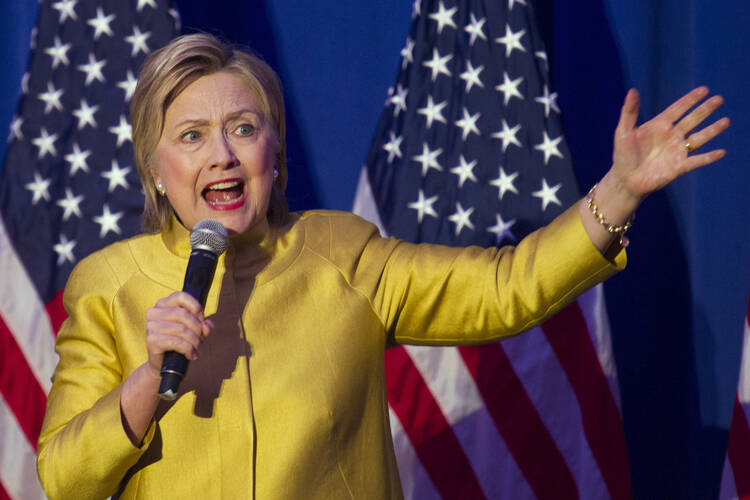According to a CNN poll released this week, the general electorate believes Hillary Clinton “would better handle” almost every policy area than would Donald Trump (see question 25). Not only do more voters trust her on education and health care, but she also has a 61-30 advantage in foreign policy and a 50-45 edge on terrorism; she even bests Mr. Trump on his signature issue, immigration, 51-44. She falls short on only one of the eight issues mentioned: Voters say Mr. Trump would better handle the economy, by a 50-45 margin.
Anxiety about long-term economic changes is Mr. Trump’s only path to winning in November (few voters are ever going to prefer that Mr. Trump be given the codes to launch nuclear weapons). More accurately, the economy gives Ms. Clinton the only way to lose.
Economic inequality, and the lack of opportunity for less-educated Americans in many parts of the country, is the reason that Bernie Sanders continues to win primaries even though it’s impossible for him to catch up to Ms. Clinton in delegates to the Democratic National Convention. The Clinton-Sanders fight has agonized many Democrats but especially Clinton supporters who feel she is the stronger candidate on matters of gender and racial equality. The Nation’s Katha Pollitt explained this week why she couldn’t support Mr. Sanders: “The problem is less that Bernie focuses on class and economic inequality than that he doesn’t seem to understand that the economy, like society generally, is structured by gender and race.”
There is a lot of truth in that statement. As Ms. Pollitt writes, you can’t guarantee equal pay for equal work when there’s a longstanding practice of undervaluing jobs that have mostly been held by women. And The Atlantic’s Ta-Nahesi Coates has masterfully made the case that promising equal opportunity for African-Americans today is a joke after centuries of government policies that prevented black families from accumulating wealth or even buying homes.
But, and I’m sure she’s smart enough not to do it, it would be an epic blunder for Ms. Clinton to make the blanket statement in her convention speech that “the economy, like society generally, is structured by gender and race.”
During the primaries, Mr. Trump has done exceedingly well among white men without a college degree, while Ms. Clinton has done poorly among younger white voters, perhaps because they are particularly anxious about their financial futures. It’s tempting to dismiss less-educated whites as simply ignorant, racist and sexist—as voters who are beyond reason and whom Ms. Clinton won’t need to win anyway. I think that’s simplistic, and I’m also dubious of the condescending explanation given by the Washington Post’s Danielle Allen, who thinks men don’t like Ms. Clinton’s “Fighting for Us” slogan: “A woman fighting for them? Rightly or wrongly, the slogan rubs the wrong way in relation to traditional notions of masculinity.”
Here’s what I think a lot of white guys without good jobs are thinking. Many realize that Mr. Trump’s economic solutions—including deporting millions of migrants and starting trade wars with China and other countries—are unrealistic and even counterproductive. But they don’t see any big ideas, or sense any feeling of urgency, from the Democratic Party. They suspect that the Democrats are resigned to a shrinking economy with an evaporating manufacturing sector and a steady decline in jobs for less-educated Americans. (See the flap about Ms. Clinton’s remark, inevitably pulled out of context, that “we're going to put a lot of coal miners and coal companies out of business.”)
They also suspect, egged on by Republicans and by media outlets like Fox News, that the Democrats have the limited goal of protecting their own constituency groups—including women, non-whites and the residents of big cities like New York—from feeling the worst effects of the shriveling American economy. They feel that their chances are better off with Mr. Trump and the Republicans, who at least promise an expanding economy that will benefit all Americans. They don’t necessarily believe the Republicans can deliver on this promise, but they feel that the Democrats have written them off as casualties, or collateral damage, of the New Economy.
Ms. Clinton will not win a majority of this demographic group in any case, and she can defeat Mr. Trump with a pretty small share of it. But whether she can win the trust of voters who are not congenital Democrats will help to determine whether a President Clinton can break the partisan logjam and get meaningful legislation through Congress. Making the election all about Mr. Trump’s crude comments about a “woman’s card” isn’t going to change our poisonous political atmosphere.








